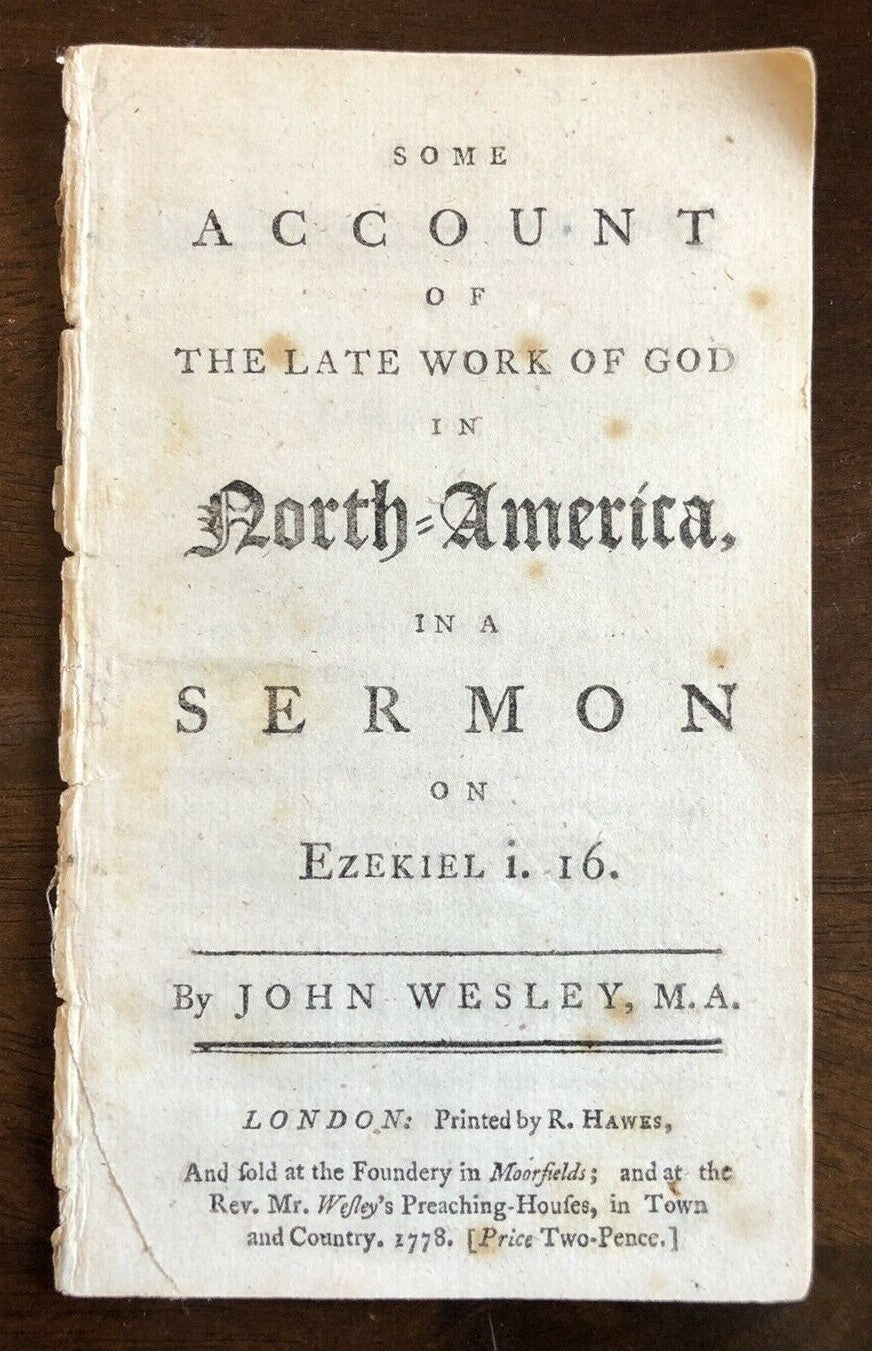Specs Fine Books
1778 JOHN WESLEY. Some Account of the Late Work of God in North-America. Rare on American Revolution and Revival
1778 JOHN WESLEY. Some Account of the Late Work of God in North-America. Rare on American Revolution and Revival
Couldn't load pickup availability
An exceptionally rare work by John Wesley written during the heat of the American Revolution, commenting on the unique character of the American people, the impact of the Great Awakening and its unique expression in America, and the ongoing Revolutionary War.
Scarce with only a few institutional examples and no copies available on the market.
Wesley, John. Some Account of the Late Work of God in North-America, in a Sermon on Ezekiel i.16. London. Printed by R. Hawes, And sold at the Foundery in Moorfields; and at the Rev. Mr. Wesley's Preaching-Houses, in Town and Country. 1778. 23pp.
Preached on the mysterious, "The appearance was, as it were a wheel in the middle of a wheel."
His views of the emerging United States are transparent, from the second page of the sermon where he calls North America, "our colonies" to the final leaf where he almost patronizes the Revolution as "the present commotion," it is clear that he views America less than favorably.
He recalls the work of God in Georgia under the Moravians in 1736, the revival under Jonathan Edwards in Northampton, the revivals under George Whitefield, etc., This is where it gets fascinating. He recalls conversations with Whitefield where Whitefield confided that he despaired of the work of God in America. The rate of falling away of his converts was unbearably high. And Wesley suggests the reason; it is bound up in the American character. They are unruly, unwilling to submit to structure, system, etc., He implies that the same rebelliousness and impetuousness that is fueling the Revolutionary War are also what keeps Americans from having more enduring effects from various revivals. They are unwilling to submit to structures and systems of spiritual discipline that would give substance and longevity to their spiritual experiences. Wesley says, "And no wonder; for they have no shadow of discipline," by which he means the organized system of discipleship and community which belonged to the Methodists.
He further argues America's ardent capitalism stands in the way of its spiritual renewal and goes all the way back to the Stamp Act. It incensed the Americans not so much because of principle, but because it impacted their idol of profit. So they exhaust their energy defending their pursuit of money and having nothing left for the pursuit of God.
He closes be insisting that the American Revolution is founded in a delusion sent by God to bring the American ethos to a place of repentance from its spirit of independence and greed and that God's end is to restore Americans to himself and to England.
"But after the inhabitants of these Provinces are brought again to seek the Kingdom of God and His righteousness, there can be no doubt, but all other blessings will be added to them. He will send through all the happy land, with all the necessaries and conveniences of life, not Independency (which would be no blessing, but an heavy curse both to them and their children) but Liberty, real legal liberty! Which is an unspeakable blessing. He will superadd to Christian liberty, liberty from sin, true civil liberty, a liberty from oppression of every kind; from illegal violence, a liberty to enjoy their lives, their persons, and their property; in a word, a liberty to be governed in all things in all things by the Laws of their Country. They will again enjoy true British liberty, such as they enjoyed before these commotions. Neither less, nor more than they have enjoyed, from their first settlement in America. Neither less, nor more than is presently enjoyed by the inhabitants of their Mother country. . . But God permitted this strange dread of imaginary evils to spread over all the people, that he might have mercy upon all, that he might do good to all, by saving them from the bondage of sin, and bringing them into the glorious liberty of the Sons of God."
A fascinating piece of Americana.
Good - copy disbound from a larger sammelband, shaken but complete. Final leaf detached. Exceptionally scarce with no other copies on the market or offered at auction.
Share


